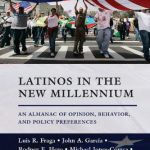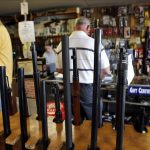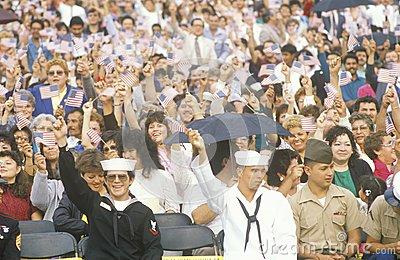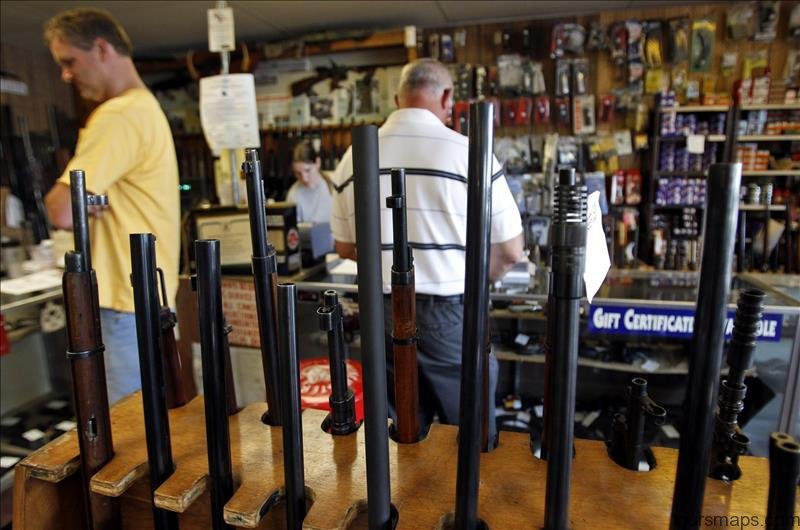In a similar fashion to the anti-immigrant campaigns of the 1990s that triggered the passing of Proposition 187, the popular discourse presented in the media in the new millennium has again created sensationalist rhetoric that targets Latinos in similar ways. Moreover, in a post-9/11 environment, Latino migrants are increasingly characterized in the media as linked to terrorism, drug trafficking, and other crimes. Terrorism and drug trafficking have become the new staging grounds for political debates focusing on the growing presence of Latinos in this country more specifically, on the U.S. border with Mexico. With the largest Latino population residing in California, the state has received increased attention in print, radio, and television campaigns targeting undocumented migrants. CNN’s Lou Dobbs, for example, has run a series titled Broken Borders, which constantly depicts migrant paths through southern California as a terrorist alley.
These recent representations of Latinos have sparked an immigration debate that has polarized the nation. One response has been a rise in anti-immigrant sentiment that targets migrants while hiding behind the veil of border protection. Such a view is represented by a group of volunteers who call themselves the Minuteman Project; they have organized civil patrols to protect the nation’s borders from illegal immigration, as frequently reiterated by the media. On the other side are migrants and U.S.-born citizens who resent the ways that they are being negatively depicted and criminalized.
At the national level, conservatives and liberals in Congress have continued to debate the future of migration across the nation’s borders. In 2005 several pieces of legislation were proposed in Congress to stem the flow of undocumented migration through Mexico. Proposals in Congress ranged from amnesty programs for undocumented laborers living and working in the United States, to guest worker programs to allow a temporary flow of a legalized labor pool, to more restriction-ist measures that would continue to reinforce the nation’s southern border by sealing off the United States from Mexico through reinforced steel and concrete barriers.
Latinos have been caught in the crossfire. As in decades past, one of the ironies remaining is that there continues to be a demand for cheap Latino labor in this country. In particular, California’s agricultural industry is still dependent on Latino manual labor. But since the 1990s, California’s booming economy also contributed to the increasing integration of Latinos into its service economy as custodians, gardeners, housekeepers, and nannies, among other occupations. Latinos resented the public hostility directed toward them and in response began to organize. Documented and undocumented Latino migrants and U.S. citizens banded together around a campaign that stressed human rights over the question of legality, boldly asserting that all immigrants have rights.
During the last week of March 2006, over one million Latinos across the country in various cities took to the streets in response to proposed anti-immigration legislation threatening to pass through Congress at the time. More than 500,000 Latinos marched in Los Angeles alone. The march represents one of the largest recent political demonstrations calling for an end to Latino racism and injustice. Moreover, it calls for a critical perspective on Latino migration one that is historically informed and is inclusive of migrant voices. In a break from the past, however, recent movements signal the ushering of a new historical moment for Latinos in California. As demonstrated by recent trends, Latinos in the state currently account for 32.4 percent of the population; according to projections, they will account for 47.8 percent of the population by the year 2040, becoming the ethnic majority in California. While the social problems of the past have not disappeared, at the closing of the first decade of the new millennium, Latinos are making strides in all areas of life, including education, occupational advancement, professionalization, and politics. The future looks promising.
notable latinos
Rodriguez Cabrillo, Juan (1499-1543). Portuguese by birth, Juan Rodriguez de Cabrillo sailed for the Spanish crown and was the first to explore the California coast in 1542.
Vizcaino, Sebastian (1548-1624). Sebastian Vizcaino explored the California coastline in the early 1600s, making detailed charts. He is also noted for exploration of the Monterey Bay area.
Serra, Junipero de (1713-1784). Junipero de Serra was a Franciscan missionary who, along with soldier Gaspar de Portola, founded 21 missions in California, including the first.
Portola, Gaspar de (1716-1784). As a soldier in the Spanish Army, Gaspar de Portola led an expedition that founded San Diego and Monterey. Portola also served as governor of Baja and Alta California from 1767 to 1770.
Requena, Manuel (1804-1876). Manuel Requena became the second Latino to become mayor of Los Angeles when he took his place as acting mayor for two weeks (September
22, 1856-October 4, 1856).
Aguilar, Cristobal (1816-1886). The third Latino mayor of Los Angeles, Cristobal Aguilar served two separate terms, from 1866 to 1868 and from 1871 to 1872.
Coronel, Antonio Francisco (1817-1894). In 1853, Antonio Francisco Coronel became mayor of Los Angeles. Born in Mexico City, Coronel came to California as a young man. During the Mexican occupation of California, Coronel was appointed assistant secretary of tribunals for the City of Los Angeles, and in 1843 he became a justice of the peace in the city. During the Mexican-American War, Coronel served as a captain and sergeant-at-arms in the Mexican Artillery. After the war, he continued to be involved in politics and served as county assessor and member of the Los Angeles Council for several years between 1854 and 1867.
Murrieta, Joaquin (1829-1853). Joaquin Murrieta was an infamous and legendary figure of the California gold rush during the 1850s who has come to symbolically represent early opposition to white, European-American domination.
Pacheco, Romualdo (1831-1899). Romualdo Pacheco is the only Latino who has served as governor of California; he held the office from 1877 to 1883. In 1876 Pacheco was elected to the House of Representatives, but he did not serve, because the House Committee on Elections refused to accept his certificate of elections. He was reelected to the House of Representatives and served until 1883. In 1879 he was appointed chair of the Committee on Private Land Claims. After leaving Congress, Pacheco was named the U.S. envoy extraordinary and minister plenipotentiary to the Central American states.
Ruiz de Burton, Maria Amparo (1832-1895). Maria Amparo Ruiz de Burton was the author of The Squatter and the Don (1885). Written in English, the book is regarded as the first Mexican American novel.
Lozano, Ignacio (1886-1953). Ignacio Lozano founded the Spanish-language newspaper La Opinion in 1926, and it has been published continuously since then. The newspaper focuses on news from Spanish-speaking parts of the world. Before founding La Opinion, Lozano established the La Prensa, a Spanish-language periodical read by Mexican political refugees.
Galarza, Ernesto (1905-1984). A historian, labor organizer, and activist, Ernesto Galarza migrated to Sacramento, California, from Mexico at the age of eight. He grew up working in the fields with his parents and excelled in education. He is one of the first Mexican Americans to have received a college education, which culminated in a PhD in history from Columbia University. Galarza dedicated his adult life to organizing farm laborers and raising awareness of their exploitation through his teaching. He wrote several books, including Barrio Boy, about his own childhood. He was nominated for the Nobel Prize in literature in 1976.
Diaz, Jose (1919-1942). Jose Diaz was a 22-year-old farmworker murdered on the morning of August 2, 1942, on the way home from a neighbor’s birthday party in what government officials called the growing Mexican American frenzy of the time. A fan of the contemporary jazz music era, he often wore a zoot suit, an outfit that had become increasingly symbolic of an unruly Mexican American youth gang culture. His murder in 1942 was used to rationalize government intervention, both violent and nonviolent, to quell a chaotic and supposedly threatening population.
Soto, Philip (1926-1997). Philip Soto was one of the first two Latinos to be elected to the California state legislature. From 1962 to 1966, Soto, a Democrat from La Puente, served as the state representative for the Fiftieth Assembly District. During his terms, he helped organize the United Farm Workers and was active in protesting the Vietnam War. After leaving office, Soto became the director of operations of a nonprofit vocational and job training program in east Los Angeles called SER: Jobs for Progress.
Chavez, Cesar (1927-1993). Activist Cesar Chavez, cofounder of the National Farm Workers Association (NFWA, later known as the United Farm Workers Association) spent most of his adult life in California. In 1965 Chavez and the NFWA organized a California grape picker’s strike to demand higher wages and encouraged U.S. citizens to
boycott table grapes to show support. Chavez also organized strikes and boycotts for the rights of migrant workers in several different agricultural sectors.
Moreno, John (1927-1999). A Democrat from Los Angeles, John Moreno was one of the first Latinos to be elected to the California state legislature. As the representative for the Fifty-First Assembly District from 1962 to 1964, he served as vice chair of the Constitutional Amendments Committee.
Gonzales, Pancho (1928-1995). Professional tennis player Pancho Gonzales was born in Los Angeles to Mexican parents. Gonzales won, among other awards, the men’s singles at the United States Championships of 1948 and 1949; the men’s doubles at Wimbledon in 1949.
Salazar, Ruben (1928-1970). As a Mexican American journalist for the Los Angeles Times, Ruben Salazar focused on issues that affected Latinos. His reports included stories about the Bracero program, the U.S.-Mexican border, racial discrimination, and ethnic politics. He was killed by police during the National Chicano Moratorium March in protest of the Vietnam War.
Escalante, Jaime (1930-). Prized Bolivian-born Los Angeles math teacher Jaime Escalante was the subject of the 1988 book Escalante: Best Teacher in America and the 1988 film Stand and Deliver. He was inducted into the Teachers Hall of Fame in 1999 and is the recipient of numerous prestigious awards, including the Presidential Medal for Excellence in Education, the George Forster Peabody Award, and numerous honorary doctorate degrees.
Huerta, Dolores (1930-). A cofounder of the National Farm Workers Association, Dolores Huerta played vital role in organizing farmworkers. Raised in Stockton, Huerta became the coordinator for the East Coast table grape boycott, led the political sector of the farmworkers’ union, and was involved with the feminist movement of the late 1960s. Huerta continues to fight for labor rights and spread awareness of farmworker injustices today.
Valens, Ritchie (1941-1959). Considered the first Chicano rock and roll star, Ritchie Valens is best known for his hit song La Bamba, which was influenced by Mexican folk music. Born in San Fernando, he died when he was 17 years old in a plane crash. Valens received a star of the Hollywood Walk of Fame in 1990 and was inducted into the Hollywood Hall of Fame in 1991.
Rodriguez, Richard (1944-). Best known for his 1982 memoir Hunger of Memory, a book that describes how learning English distanced him from the native culture of his parents, Richard Rodriguez is an accomplished author. As a public intellectual, he appears frequently on the MacNeil/Lehrer News Hour and is a contributing editor for Harper’s magazine.
Marin, Richard Cheech (1946-). Born in South Central Los Angeles, comedian and actor Richard Cheech Marin is perhaps best known for his role as half of the comedy duo Cheech and Chong. Marin wrote, directed, and starred in the comedy Born in East LA (1987). He has also appeared in numerous films and television shows. Additionally, Marin is active in Latino politics and volunteers for the Hispanic Scholarship Fund and the Inner City Arts Council.
Olmos, Edward James (1947-). Most known for his roles in the film Stand and Deliver and more recently the PBS miniseries Mi Familia (My Family), Mexican American Edward James Olmos is an Emmy-winning actor hailing from east Los Angeles. In 1998 he founded Latino Public Broadcasting Company with the goal of supporting diverse perspectives on public television and providing funding for programming about issues that affect Latinos.
Molina, Gloria (1949-). A native Angelina, Gloria Molina is a member of the Los Angeles County Board of Supervisors and the chairwoman of the Los Angeles County Metropolitan Transportation Authority. In April of 2006, she was voted Hispanic Businesswoman of the Year by the Hispanic Business Magazine. Other important positions she has held are deputy for presidential personnel; deputy director for the Department of Health and Services; and California state assemblywoman.
Gonzales, Ronald R. (1951-). Ron Gonzales was elected the first Latino mayor of San Jose since California gained statehood in 1850. Gonzales has received several national honors, including the Point of Light Award, in recognition of his contributions to his community.
Moraga, Cherrie (1952-). Cherrie Moraga was born in Los Angeles in 1952, and her Chicana roots have informed her experiences as a lesbian poet, playwright, essayist, scholar, and activist. Her work in the theater has contributed to the growth of Chicano theater, and she is the recipient of numerous prestigious honors and awards, including the National Endowment for the Arts Theatre Playwriting Fellowship Award. In 1983 Moraga cofounded the group Kitchen Table: Women of Color Press. She is also coeditor of the pivotal Chicana feminist text This Bridge Called My Back: Writings by Radical Women of Color, coauthored separately with Gloria Anzaldua and Ana Castillo.
Soto, Gary (1952-). Born in Fresno, award-winning Gary Soto has written numerous books of poetry as well as young adult and children’s books. Soto won the American Book Award for his 1985 memoir Living Up the Street (1985) and was a National Book Award finalist for his 1995 book New and Selected Poems.
Bustamante, Cruz Miguel (1953-). Until 2003, Cruz Miguel Bustamante held the highest-ranking elected position among Latinos living in the United States. Bustamante has served as a California assemblyman (1993-1996), speaker of the assembly (1996-1998), and lieutenant governor (1999-2007). In 2003 he ran for governor of California, but lost to Arnold Schwarzenegger. As a Democrat, Bustamante focused on education, the environment, racial tolerance, diversity, and the support of migrant and agricultural communities.
Villaraigosa, Antonio (1953-). An east Los Angeles native, Antonio R. Villaraigosa was elected the forty-first mayor of Los Angeles on July 1, 2005. Prior to becoming mayor, Villaraigosa served in the California state assembly and in 1994 was elected the first assembly speaker from Los Angeles in 25 years. In 2003 he was elected part of the Los Angeles City Council.
Cervantes, Lorna Dee (1954-). Lorna Dee Cervantes, an accomplished and award-winning poet, was born and raised in California. Her poems and novels offer deep insight into the lives and experiences of Mexican Americans living in the northern
California communities she was raised in. Her works include From the Cables of Genocide: Poems on Love and Hunger (1991), a collection of poems; and Emplumada (1981), her first book that received an American Book Award. In 1995 she received a Lila Wallace-Reader’s Digest Writers’ Award.
Solis, Hilda L. (1957-). As a congresswoman in the House of Representatives, Hilda L. Solis has been recognized for her leadership. Among her many accomplishments, Solis’s dedication to environmental justice earned her a John F. Kennedy Profile in Courage Award (2000). She was the first woman to receive this honor. Solis has also served as the first Latina on the Committee on Energy and Commerce (2003).
Ochoa, Ellen (1958-). Southern California native Ellen Ochoa is the first female Latina astronaut for NASA. In 1993, Ochoa went on her first space shuttle mission aboard the Discovery. Ochoa has won many awards, including two Space Act Tech Brief Awards, three Space Flight Medals, an Outstanding Leadership Medal, an Exceptional Service Medal, the Women in Aerospace Outstanding Achievement Award, and the Hispanic Heritage Leadership Award.
Escobedo Cabral, Anna (1959-). Born in San Bernardino, Anna Escobedo Cabral is the forty-second treasurer of the United States. Cabral, a second-generation Mexican American, was confirmed and sworn in to the position on December 13, 2004. As president and CEO of the Hispanic Association on Corporate Responsibility, Cabral worked with Fortune 500 companies to increase Latino presence in leadership, employment, philanthropy, and governance. She has served as deputy staff director for the U.S. Senate Judiciary Committee (1993-1999) and as executive staff director of the U.S. Senate Republican Conference Task Force on Hispanic Affairs (1991-present).
Lopez, George (1961-). George Lopez, a Mexican American comedian and actor known for his satirical representations of Mexican American culture in the United States, is the fourth Latino male to headline a sitcom in the United States. As an active member of the Latino community, Lopez also started the George and Ann Lopez-Richie Alarcon CARE Foundation, an organization that provides educational community and arts resources.
Tobar, Hector (1963-). Born to Guatemalan parents in Los Angeles, Hector Tobar is a noted author, journalist, and foreign correspondent of the Los Angeles Times. He is author of Translation Nation: On the Trail of a New American Identity (2005) and Tattooed Soldier (1998). His work for the Los Angeles Times earned him a Pulitzer Prize in 1992. In 2006, Hispanic Business Magazine named Tobar one of the 100 Most Influential Hispanics in the United States.
Alcaraz, Lalo (1964-). Lalo Alcaraz is a Mexican American cartoonist best known for his daily syndicated comic strip La Cucaracha. Alcaraz’s work focuses on Latino political issues, like migration, border politics, and race relations. Alcaraz is also host of The Pocho Hour of Power, a Pacifica Radio weekly political humor show.
De La Hoya, Oscar (1973-). One of the best contemporary boxers from the United States, Oscar De La Hoya was born to Mexican migrant parents in east Los Angeles. He captured a gold medal in the 1992 Olympics and since then has won five boxing titles in five different weight classes.
Gutierrez, Oscar (Rey Mysterio Jr.) (1974-). Better known as Rey Mysterio Jr., Oscar Gutierrez, a professional wrestler, is known for the mask he wears during his World Wrestling Entertainment appearances.
Furcal, Rafael Antoni (1977-). Dominican American baseball star Rafael Antoni Furcal currently plays shortstop for the Los Angeles Dodgers. Known for his strong throwing arm, he was awarded the National League Rookie of the Year Award in 2000.
Rodriguez Jr., Paul (1984-). Paul Rodriguez Jr. won a gold medal in skateboarding in the 2005 X Games. Rodriguez was born in Chatsworth, California, and is the only Latino to have a professional model show sponsored by Nike.
Latinos at the Millennium on California Photo Gallery
Maybe You Like Them Too
- Top 10 Islands You Can Buy
- Top 10 Underrated Asian Cities 2023
- Top 10 Reasons Upsizing Will Be a Huge Travel Trend
- Top 10 Scuba Diving Destinations
- The Best Cities To Visit in The World








